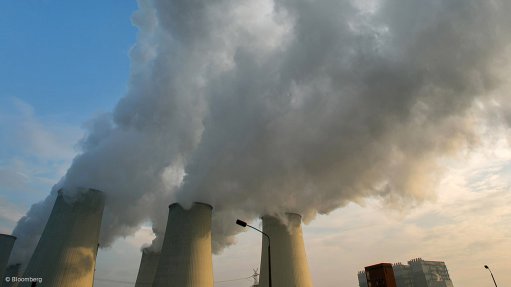
Photo by: Bloomberg
Environmental Affairs Minister Edna Molewa has welcomed a recent decision by Sasol to withdraw its legal action against herself and the National Air Quality Officer in the High Court of South Africa.
On April 17, the petrochemicals group gave notice in the North Gauteng High Court of its intention to withdraw legal action that was instituted in 2013 in an attempt to set aside Minimum Emission Standards (MES) applicable to Sasol’s industrial activities.
This application was opposed by the Department of Environmental Affairs (DEA).
The MES, first published in 2010, were legislated in terms of the National Environmental Management: Air Quality Act (NEM: AQA) and required plants to comply with existing plant emissions standards by April 1 and with stricter new plant standards by April 1, 2020.
Sasol had initially applied to be exempted from the MES, but this request was refused, as the NEM: AQA did not allow for exemptions.
However, the Act did allow for any listed activity or industry to submit an application for the postponement of the compliance timeframes to the National Air Quality Officer at the DEA.
Such postponement of the compliance timeframes may be granted for a period not exceeding five years for each postponement.
“These postponements provide an opportunity for industry to take the necessary action and retrofit their plants to enable them to comply with the standards in the near future,” the department explained.
An application for postponement must include an air pollution impact assessment, a detailed justification and reasons for the application and a concluded public participation process.
Sasol had applied for postponements of timeframes for compliance with the MES in terms of Section 21 of the NEM: AQA, which could only be granted for a period not exceeding five years.
The department reported that it had also received 37 applications for postponements from other energy and mineral groups, including Engen, Shell, Eskom and Anglo American Platinum.
The allowance for the postponement of applications in the regulations provided transitional arrangements for industries that were in existence in 2010, when the regulations were first promulgated, to take the necessary action and make the required investments towards compliance with the MES.
Decisions on postponement applications were communicated on February 24 and Sasol group media relations head Alex Anderson told Engineering News Online on Wednesday that the department had, in response to the group’s application for postponement, imposed “stretched targets”.
“These decisions have since also been incorporated into our atmospheric emissions licences, to reflect the conditions under which we must operate during the postponement period.
“Our focus is now on implementing our committed air quality improvement roadmaps, including community-based offsets to sustainably improve ambient air quality where we operate,” he commented.
While having been granted extended timeframes within which to comply with some of these 2015 standards, Anderson added that postponements may not adequately address Sasol’s longer-term compliance challenges, particularly where feasible solutions were not presently available to achieve compliance with the new plant standards which existing plants have to comply with by April 2020.
“No decision to grant a postponement is reached lightly, [it is] reached upon careful consideration of all variables. We remain mindful of the need to balance environmental protection with economic development,” added Molewa.
The department said in a statement this week that it played a key role in ensuring that the Constitutional right of South Africans to an environment that was not harmful to health and wellbeing was “always” taken into consideration, while ensuring that socioeconomic growth is not hampered.
“One of the objectives of the Air Quality Act is to ensure ecologically sustainable development while promoting justifiable economic and social development,” it outlined.
Since 1994, South had put in place progressive environmental legislation that the department believed had facilitated a dramatic and sustained process of forming environmental guiding principles and building and restructuring institutions.
This policy, it averred, recognised the intricate linkages between socioeconomic developments and environmental stewardship.
“The environmental sector has become a significant contributor to economic development, job creation and poverty alleviation.
“The department is committed to the principle of sustainable development that recognises the interdependency between economic growth, social equity and environmental integrity,” it stated.